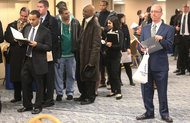 FORTUNE — A new non-partisan report has set off a storm of dueling arguments over the perennially testy question of raising the minimum hourly wage.
FORTUNE — A new non-partisan report has set off a storm of dueling arguments over the perennially testy question of raising the minimum hourly wage.
The proposal, by Democrats, to raise the minimum wage to $10.10 per hour would bring some 900,000 families above the poverty line and boost the income of an additional 16.5 million workers, but any such pay increase could also cost the jobs of as many as 500,000 workers, an analysis by the Congressional Budget Office found.
Almost as soon as the report was released Tuesday, opponents began to cite the report in an effort to torpedo any Congressional vote to hike the federal minimum from $7.25 per hour to $10.10 by 2016.
One such detractor was House Speaker John Boehner, Republican of Ohio, who noted through a spokesman that, “While helping some, mandating higher wages has real costs, including fewer people working.
MORE: For investors, diamonds might be the new gold
“With unemployment Americans’ top concern, our focus should be creating — not destroying — jobs for those who need them most.”
Supporters of the proposal rallied to defend the proposed wage increase, noting that an array of economic studies examining prior increases had established that job losses would be minimal.
“Zero is a perfectly reasonable estimate of the impact of the minimum wage on employment,” said Jason Furman, chairman of the Council of Economic Advisers, in a conference call with reporters to respond to the CBO findings.
Joseph Stiglitz of Columbia University, one of 600 economists who signed a letter endorsing a rise in the minimum wage, said, on a separate conference call, that the CBO “has underestimated the benefits and overestimated the costs.”
He and other economists on the call said the CBO report did not consider how additional wages will increase productivity and reduce turnover, absenteeism, and dependence on federal benefits.
“The cost,” Stiglitz noted, “is typically passed on. And, yes, it does come at the expense of the upper-income individual, but they are doing well, and this only rectifies the inequality to a minor extent.”
Overall, as many as 27.8 million workers could see more money in their pockets with a minimum wage rise because other workers who are already earning in the $10 range would likely receive boosts to their paychecks, the economists said.
President Obama initially supported a federal minimum age of $9 per hour, but has since backed the larger increase as Democrats seek to make the effort a campaign issue this fall.
The CBO analysis looked at the effects of both $9 and of $10.10 minimum wage, but concluded the lower amount would lift only 300,000 workers above the poverty line, but could result in 100,000 jobs being lopped off. The rise to $10.10 would bring three times as many workers out of poverty, but could translate into a loss of an estimated half-million jobs, according to the CBO.
The proposal is expected to face a vote in the Senate later this year, and may pass, but it will likely to be avoided by the Republican-dominated House.
Proposals to lift the minimum wage typically are fraught efforts as business owners, particularly those in the food industry, warn they will need to fire people to offset the higher salary requirements, and that customers will not pay higher prices to support the wage increases.
MORE: As college professors lose earning power, unions gain appeal
That’s been accepted wisdom by many until higher-wage proponents began arguing that many low-wage workers rely on publicly financed benefits such as food stamps to make ends meet. Rallies have been held at fast-food outlets in a number of cities over the past year to highlight the connection between taxpayer subsidies and the lower wages companies pay.
Critics have argued that minimum-wage jobs are starter jobs held by teenagers for spending money, but recent studies have found that most of these workers are in their 30s, have children, and work full-time.
Skirmishes over raising the wage floor date back to 1938, when the first law was passed to set a minimum wage amount, and nearly every effort to raise it has brought accusations of government interference.



